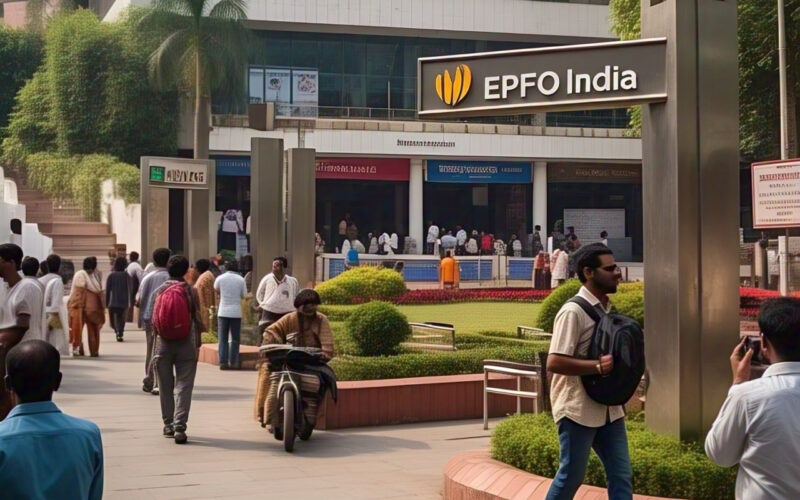#EPFO #HigherPension #EPSAmendment2014 #PensionOnHigherWages #SupremeCourtOrder #SocialSecurity #RetirementPlanning #EPF #LabourMinistry #EmployeeWelfare #EPFOIndia #EPFUpdates #GovtOfIndia #PensionRights #FinancialSecurity
New Delhi: The Employees’ Provident Fund Organisation (EPFO) has made significant progress in processing applications for higher pension under the amended Employees’ Pension Scheme (EPS), 2014. As of July 16, 2025, the EPFO has disposed of over 98.5% of the 15.24 lakh applications it received from employees seeking pension benefits based on their actual salaries exceeding the statutory cap of ₹15,000.
This update was shared in a written reply to the Lok Sabha by Shobha Karandlaje, Minister of State for Labour & Employment. The clarification marks a key milestone in the implementation of the Supreme Court’s order dated November 4, 2022, which upheld the legality of the 2014 amendment and paved the way for eligible employees to opt for a pension on actual wages rather than the capped amount.
🏛️ Background: What Is Pension on Higher Wages (PoHW)?
The Employees’ Pension (Amendment) Scheme, 2014 revised the pensionable salary limit under EPS from ₹6,500 to ₹15,000 per month. Importantly, it allowed employees and employers to jointly contribute 8.33% of the actual salary, even if it exceeded the ₹15,000 cap, to build a higher pension corpus.
However, due to ambiguities in implementation, many employees who wanted to contribute on their higher actual wages were denied the opportunity. The matter reached the Supreme Court, which in November 2022, upheld the amendment and allowed eligible employees—those who were EPS members as on September 1, 2014—to opt for higher pension contributions.
The court directed EPFO to give such employees and their employers a six-month window to apply. This deadline was subsequently extended several times to ensure that all eligible beneficiaries could file the necessary documentation.
📊 Application Status as on July 16, 2025
According to the Ministry of Labour & Employment, the EPFO has processed the vast majority of applications efficiently:
-
Total Applications Received: 15.24 lakh
-
Applications Disposed of: ~98.5%
-
Applications Rejected: 11.01 lakh
-
Demand Letters Issued: ~4 lakh (estimated from remaining data)
-
Applications Pending: 21,995
The rejections stem from multiple reasons, including ineligibility, incomplete documentation, non-verification from employers, and mismatches in wage contribution history.
The 21,995 pending cases are under review and may require further scrutiny or supporting documents from the applicants or their employers.
⚖️ Supreme Court Judgement and Its Impact
The landmark verdict delivered by the Supreme Court in November 2022 upheld the right of eligible EPS members to receive pension on the basis of their actual wages rather than a capped amount. This decision has significant implications for thousands of private-sector employees, especially those working in the organised sector, who have contributed to the Employees’ Provident Fund (EPF) and EPS for years on their full salaries.
The court also clarified that EPS members as of September 1, 2014, who had not exercised their option for higher pension earlier, were now eligible to do so, provided they submitted the required joint option and proof of employer contribution.
The ruling also directed EPFO to ensure seamless and time-bound implementation, prompting a series of circulars, FAQs, and portal updates to facilitate employee and employer compliance.
🧾 EPFO’s Efforts to Streamline Implementation
Following the court’s decision, the EPFO launched a dedicated online facility on its unified portal to enable employees and employers to submit joint applications for higher pension. Several deadlines were extended, and circulars were issued to clarify eligibility, calculation methods, and supporting documentation requirements.
To support processing:
-
Regional EPFO offices were directed to fast-track verifications.
-
Employers were engaged through direct communication and webinars.
-
Applicants received automated updates on application status via email/SMS.
Despite these efforts, a significant number of applications were rejected due to technical errors, lack of documentation, or ineligibility as per the SC ruling.
🧮 Why This Matters: Implications for Workers and Retirees
The PoHW scheme provides an opportunity for eligible employees to significantly increase their monthly pension upon retirement. While regular EPS pensions are often modest (₹1,000–₹3,000 per month), those opting for pension on higher wages could receive ₹10,000–₹40,000, depending on their contribution history and salary levels.
The move is seen as a long-overdue correction in India’s pension structure, ensuring that long-term contributors receive benefits proportionate to their actual wages.
However, financial planners warn that higher pension contributions come at the cost of reduced lump sum EPF withdrawal at retirement, as more funds are redirected into EPS. Employees are advised to evaluate their retirement needs before opting in.
🔮 What’s Next?
With over 98% of applications processed, EPFO’s focus now shifts to:
-
Resolving pending applications
-
Handling grievances and appeals
-
Continuing awareness for new eligible applicants (if re-opened)
Some employee associations have also sought further clarity on pension calculation formulas, cut-off dates, and the appeal process for rejections.
As the dust settles, the successful implementation of the Supreme Court’s order marks a major administrative and legal win for India’s social security framework—paving the way for a more equitable and sustainable pension model.
📌 Key Takeaways
-
Over 15.24 lakh applications received for higher pension; 98.5% processed.
-
11.01 lakh applications rejected; ~4 lakh approved.
-
Only 21,995 applications pending.
-
EPFO acted as per Supreme Court order (Nov 2022) on EPS 2014 amendment.
-
Employees can receive significantly higher pension if opted and approved.
-
Processing continues for pending and disputed claims.
📢 Hashtags
#EPFO #HigherPension #EPSAmendment2014 #PensionOnHigherWages #SupremeCourtOrder #SocialSecurity #RetirementPlanning #EPF #LabourMinistry #EmployeeWelfare #EPFOIndia #EPFUpdates #GovtOfIndia #PensionRights #FinancialSecurity

